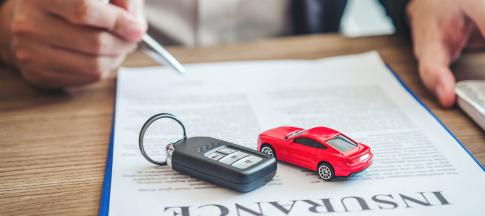
Car insurance can seem complex, especially if you're renewing your cover and aren't sure what to look for.
If you're buying car insurance for the first time, the different elements of cover may seem especially confusing.
Whether you’re unsure about whether you need car insurance, to what kind of car insurance you need, to how elements of car insurance such as no claims bonus, groups and excess work, we're here to help.
If you already have a car insurance policy with Admiral, you can take a look at your policy documents on MyAccount to find out more about your car insurance cover.
Why do you need car insurance?
It’s illegal to drive a car without a minimum of third-party car insurance in place. If you’re caught driving without valid insurance, you could face:
- six penalty points added to your driving licence
- a £300 fixed penalty
- losing your car if it’s seized by the police
- collection fees to reclaim your car
- a crushed car if it’s not reclaimed within 14 days
- potential court prosecution – if this happens you can get an unlimited fine and be disqualified from driving
You may also find that any insurance you buy in the future will likely be more expensive, or you may be blocked from buying cover altogether.
Even if you don’t use your car that often, or never drive it, at all, unless you’ve declared it as SORN and it’s kept off the road, you’ll still need motor insurance.
Read our guide on how to find out if your car is insured.
Which level of car insurance cover do you need?
Car insurance can be split into three main categories:
- third party
- third party, fire and theft
- fully comprehensive
The level of car insurance cover you buy will depend entirely on your own circumstances; the car you drive, the level of risk you think you’re exposed to and how much you can afford.
You legally have to have some kind of third-party cover in place.
However, investing in fully comprehensive cover could end up costing you less in the long run if you are involved in an accident or if someone damages your car.
Before you choose a policy, check the terms and conditions to make sure you’re covered for everything you expect to be.
Read our guide on how to choose the right level of car insurance.
Which class of use?
Choosing the right class of use for your car insurance is essential for you to be properly covered; there are a number of different classes of use to choose from:
- Social, domestic and pleasure
- Commuting
- Business use
- Policyholder only
- All drivers (the policyholder and any named drivers)
- Carriage of goods for hire and reward
Think carefully about how you use your car. If you choose a different class to the one you need – in the eyes of the law your car will be uninsured.
If your job changes mid-term and you use your car for different reasons, you may need to review the class of insurance you need.
How the excess works
A car insurance excess is the amount you have to pay in the event of claim.
This varies depending on your car, the named drivers and if you have protected or guaranteed No Claims Bonus.
An excess works to deter drivers from making claims for minor damage.
How the no claims bonus works
For each year you drive without making a claim or having a claim upheld against you, you benefit from a no claims discount or no claims bonus.
You can build up a no claims bonus for 15 years, and take it with you from insurer to insurer.
Read our guide on the no claims bonus to find out more about how it works.
How you affect your premium
Car insurance premiums vary from person to person and car to car, as lots of different factors are taken into account from your age to your address to your driving experience.
The lower the risk you present, the lower your car insurance premium is likely to be.
Find out more about how your car insurance prices can be impacted by different personal factors with our guide.
Car insurance groups
Car insurance groups range from group 1 (the cheapest to insure) to group 50 (the most expensive).
These groups are broadly set by The Group Rating Panel and administered by Thatcham research, and Admiral takes these groups into account when calculating our car insurance premiums.
Groups don’t just depend on the value of the car; they depend on the type of car, and the likelihood that they will be driven a certain way.
As each insurer groups cars differently and takes external groups into account to a different extent when calculating their premium, there’s is no ‘one size fits all’ rule to car groups.
Temporary car insurance
Temporary car insurance is a short-term solution to arranging car insurance quickly for a short period of time.
If you’re learning to drive, need to use a car for a weekend or if you want to add a second car to your policy for a short period of time, there are different types of temporary car insurance to suit your needs.
Putting your children on your policy
While putting children on your car insurance policy can sometimes be a good idea, it’s important to check whether adding them to an existing policy pushes up the cost.
Check the car insurance group that your car belongs in – if it’s considered a risky motor, then adding children to the cover may be really expensive.
Make a claim
In the event you need to make a claim, there are a few things you need to do straight away:
- Make sure everyone involved is safe
- Collect information of those involved and details of the incident, including pictures
- Call your insurer – if you're with us, call 0333 220 2034 or visit our make a claim page
You should call your insurer as soon as possible after an incident, even if you don’t want to make a claim.


